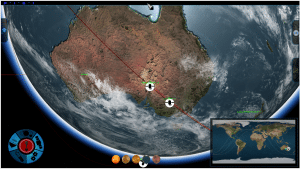Latest News

Saber Astronautics’ Predictive Interactive Group Interface (PIGI). Photo: Saber Astronautics / Delta-V
[Via Satellite 08-26-2014] Delta-V, a new space industry accelerator, hopes to create a $1 billion commercial space industry in Australia. Ranked by the World Bank as a high-income country with a Gross Domestic Product (GDP) of $1.561 trillion in 2013, Australia has high potential to be one of the world’s next satellite industry hubs. Delta-V founder Tim Parsons spoke to Via Satellite about the steps his accelerator is taking to jumpstart entrepreneurism in the country.
“We are seeing the beginnings of traction in spacecraft that are delivering big data outcomes and sensor outcomes. We are starting to see people who are spending money on Earth-based sensor networks who are suddenly realizing they don’t need hundreds or tens of millions of dollars to do space missions,” he said. “We feel we need to now get to the stage where we bite the bullet and start recruiting startup teams and run our acceleration program, which will draw in customers, investors and advisors alongside startup teams.”
Delta-V is currently working with a team of two startups, Saber Astronautics, and Launchbox, as well as select teams at Sydney University and the University of New South Wales. The state government of New South Wales’ Department of Trade and Investment (DTI) also got involved early on, encouraging the group to spearhead the development of new space companies. Saber Astronautics assisted with SkyCube, a crowdsourced small satellite deployed from the International Space Station (ISS) in January 2014, for which the company also performed ground operations. Since then, Delta-V has partnered with Space Angels Network in the U.S. and is preparing to help build the “Skybox Imagings” of the Southern Hemisphere.
“Usually a company that starts crosses a series of chasms, and eight years is about the time you could exit from that company if you are an early-stage investor,” explained Parsons. “I would say we would love to see the first few success stories over the next two to three years, and over the next six to eight years we would like to see one or two $100 million-plus success stories.”
For Australia to build its own commercial space industry, international markets will be crucial, according to Parsons. Australia’s geographic location places its citizens in the same time zone as a sizeable percentage of the world’s population. Should companies pursue a monopsony focused exclusively on Australia’s population of less than 23 million, it could doom them.
“We can’t leverage nearly as much domestic strength as bigger countries,” said Parsons. “That underpins a lot of companies that do quite well, because they have a big domestic market. Companies in Australia thrive or die very fast because the domestic market is so small.”
Parsons added that a number of space companies such as Boeing, Northrop Grumman and Lockheed Martin all have a presence in Australia, but stay primarily concentrated on defense. Goals for Delta-V startups would instead focus on solutions that meet other demands by providing space-based solutions. For example, Parson said the Philippine government has responded positively to the idea of fostering collaboration between Australian satellite startups and Philippine universities on quick reaction SmallSat missions following natural disasters. Using SmallSats, an Australian company could deploy a $1 million short-term mission whose value in data would greatly exceed the cost of the program. Other regional customers could provide more opportunities.
“In South East Asia alone there is a middle class of several hundred million people that’s newly minted who want, at the same time, sustainable economic growth … the national prestige model is still there, but it doesn’t work so well when you have rapidly developing middle classes who want fiber to the home. They want fiber-speeds but don’t have the money to lay out massive fiber networks, so then let’s do high-speed ‘fiber’ networks by satellite,” said Parsons.
Australia has seen entrepreneurs such as Planet Labs CTO Chris Boshuizen who graduated from the University of Sydney, and Deep Space Industries Co-founder Daniel Faber, who graduated from the University of South Wales. NewSat has a hosted payload named Jabiru 2 that is soon to launch aboard Measat 3b in September. The same Ariane 5 launch will carry the Optus 10 satellite for Optus Networks, who is assisting the government-run NBN Co in rolling out connectivity across the Australian continent. NewSat also has plans for a Ka-band satellite named Jabiru 1 to serve Middle East and North African (MENA) markets. Parsons, acknowledging these and other companies, anticipates Australia soon entering the top ranks of countries involved in space.
“If we can build the whole ecosystem to start generating more than $1 billion a year, which is roughly what the defense industry does right now … then we will be thrilled,” he said. “We don’t think that is a ridiculous target to shoot for, but it’s going to require us to be pretty smart.”
Get the latest Via Satellite news!
Subscribe Now